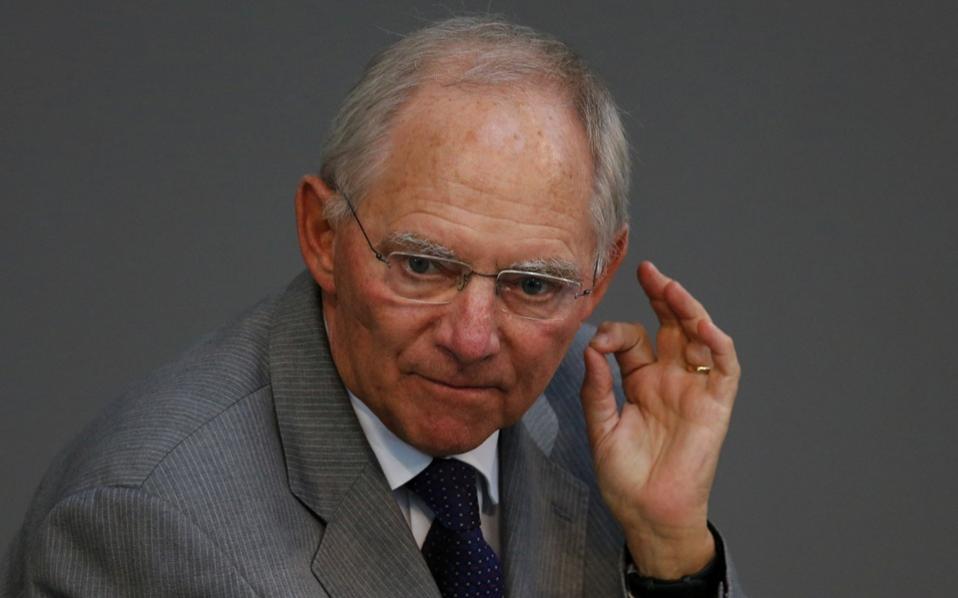Schaeuble shrugs off Greek vote saying euro exit may yet be best

German Finance Minister Wolfgang Schaeuble told Greece the only way it’ll get a debt reduction is to leave the euro and cast doubt on the country’s ability to even complete negotiations on a third bailout.
Schaeuble, who led the charge for Greece to take time out from the single currency region, said the Greek parliament’s vote to accept the austerity that is a precondition of further aid was a “step further forward.” Yet he reiterated his view that a temporary exit from the 19-nation euro region may be “the better way” since it would allow the debt forgiveness that is necessary yet banned under euro rules.
Given Greek financing needs, “we’ll see in the negotiations if there’s even a way to arrive at a program,” Schaeuble said in an interview on Deutschlandfunk radio on Thursday. “I don’t know, nobody knows at the moment how this is supposed to work without a haircut and everybody knows that a haircut is incompatible with euro membership.”
The broadside from the finance chief of Europe’s biggest economy underlines the hurdles that remain for Prime Minister Alexis Tsipras even after he had to rely on opposition votes to pass the pension curbs and state-asset sales required just to begin talks on aid of up to 86 billion euros ($94 billion).
ECB decision
The next challenge will be the European Central Bank’s decision due later Thursday on whether to pump more money into the country’s hobbled financial system. The German lower house, or Bundestag, will then vote Friday on starting negotiations to help Greece cover its debts and pay pensions and salaries.
Greece also needs to secure bridge financing to cover immediate needs that include a 3.5 billion-euro payment to the ECB due on July 20. The European Union has proposed a facility worth 7 billion euros to tide the country over until implementation of the full bailout begins. Euro-area finance ministers are due to hold a conference call on Greece Thursday morning.
In Athens, 229 members of the 300-seat parliament approved the so-called prior action austerity measures in the early hours of Thursday after more than four hours of debate. Among those who opposed the bill were 32 members of Tsipras’s Coalition of the Radical Left, or SYRIZA, in a sign the premier may have lost his majority.
‘No alternative’
Accepting the agreement with creditors “was a decision which will be a burden for me for the rest of my life,” Finance Minister Euclid Tsakalotos told lawmakers at the start of the debate. “I don’t know if we did the right thing. But I know we did something to which there was no alternative.”
European stocks followed Asia higher, with the Stoxx 600 Index up 1 percent as of 9:59 a.m. in Frankfurt. The euro slipped 0.5 percent to $1.0897.
The vote shifts the onus to the ECB and other euro-region governments to deploy more emergency funds that would help Greek banks gradually re-open and repair the country’s battered coffers.
Finding a way to open banks and allow normal commerce to resume will be the Greek government’s first priority. In its Thursday meeting, the ECB will discuss whether to increase the level of so-called emergency liquidity assistance it provides to Greek lenders, which have been shut for more than two weeks to stem withdrawals.
Varoufakis vote
Europe’s most indebted country came closer than ever to being forced out of the single currency this month after Tsipras stunned European leaders by calling a snap referendum on spending cuts and tax rises demanded by creditors. Despite a clear majority of Greeks voting “no,” he was forced to capitulate to an even more onerous package that political chiefs said was the only way for Greece to remain in the euro.
Yanis Varoufakis, the former finance minister who clashed repeatedly with Schaeuble, was among 38 members of Syriza’s 149- member parliamentary caucus who either voted “no” or abstained in parliament.
The outcome “constitutes a serious division of SYRIZA,” Greek government spokesman Gabriel Sakellaridis said in a statement. Tsipras’s priority now is to conclude an agreement with Greece’s creditors, he said.
The level of opposition suggests Tsipras may be forced to rule with a minority government, relying on opposition lawmakers to pass legislation, or co-opt the opposition into a government of national unity. A reshuffle is due as soon as Thursday.
“A minority administration will prove unsustainable, making a national unity government likely,” Eurasia Group analyst Mujtaba Rahman said in a note to clients. Such a government, comprising all the major parties, “may prove to be the only way possible” to secure bailout funds, Rahman said.
[Bloomberg]





